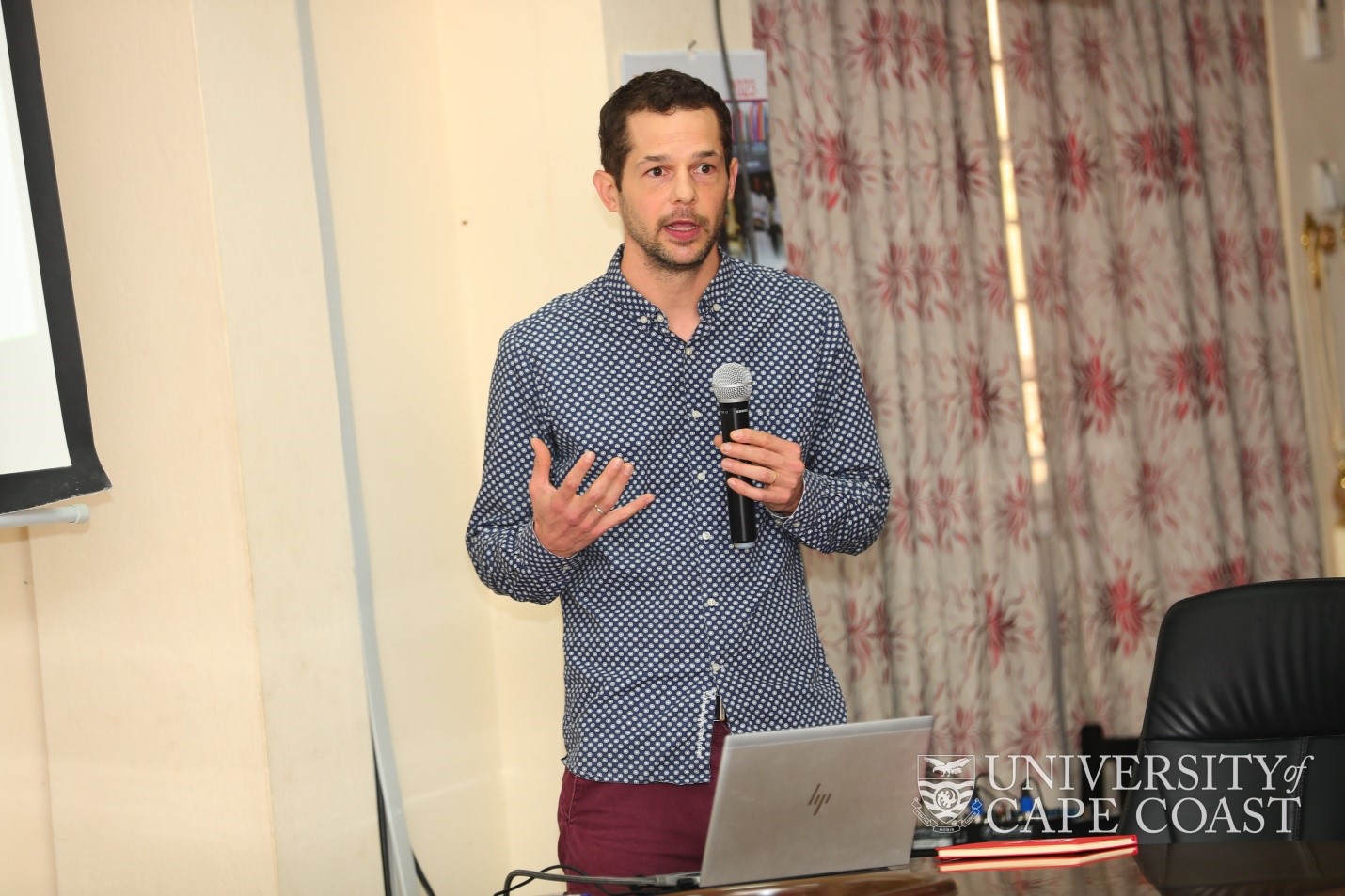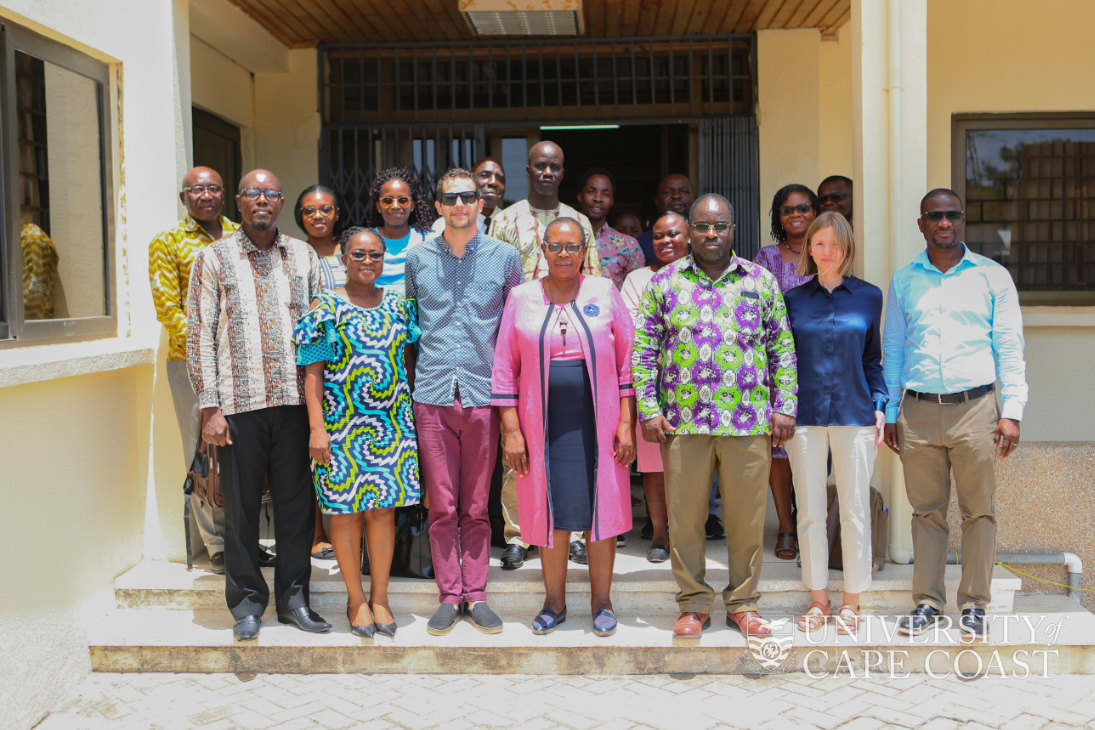A public lecture on the role of farmer organisations in collective action for the attainment of the SDGs has been held at the University of Cape Coast.
The lecture formed part of the Mobilizing Farmer Organisation for Sustainable Agriculture in Sub-Saharan Africa (FOMPO) Project, which seeks to explore the emergence and outcome of farmer mobilization for sustainable and small holder-centered agriculture development in Sub-Saharan Africa. The Public Lecture was chaired by Professor Frederick Ato Armah, an Environmental and Sustainability Scientist, who is the country lead on the project. The lecture was attended by faculty and students of UCC, and other participants from Uganda, Zimbabwe, Sweden, and Ghana.

Prof. Chad Boda
The first speaker was Chad Boda, an Associate Professor of Environmental Science at the Department of Urban Studies, Malmo University, Sweden. His topic was "Comparing Perspectives on the role of Smallholder Farmers in Sustainable Development." About two-thirds of the 3 billion rural people live in developing countries that about 475 million households are smallholder and work on lands less than 2 ha. These smallholdings often fail to generate sufficient income for the farmers’ families. They do, however, fulfil an important function and have the potential to make a significant contribution to the population’s food security as they produce around three quarters of the country’s staple foods.
According to him, smallholder farmers, who are the main actors in maintaining food security in developing countries, should prioritise advocacy to remain relevant and competitive in the sustainable development agenda. He reiterated the need for farmers to take an active role in social change. Prof. Boda also indicated that smallholder farmers could be competitive at any level provided the necessary measures including political freedom, social opportunities, protective security amongst others are put in place.

Prof. Frederick Ato Armah, immediate past Director of DRIC.
The second speaker was Dr Ellinor Isgren (FOMPO Project PI), a Researcher at the Lund University Centre for Sustainability Studies (LUCSUS), and a Senior Lecturer at the School for Global Studies, University of Gothenburg, Sweden. She shared findings on smallholder farming from research studies in Uganda. Making her presentation on the topic: "From Policy to Politics in Sustainable Agriculture Development: The case of Rising Pesticides use in Smallholder Contexts", she noted that smallholder farmers produce about 90 per cent of the staple food citizens consumed in Uganda. This implied that they were the main actors in maintaining food security in the country.
She opined that the use of unapproved pesticides did not only pose health dangers to humanity but also environmental challenges that have dire consequences for the entire world. She said the use of unapproved pesticides portend dangers for the environment and human safety as well and advised farmers against patronising non-approved agrochemicals. Dr. Ellinor Isgren, called for the support of stakeholders in the agriculture value chain to educate farmers on the dangers of using illegal and fake pesticides.
She also called on African leaders to set clear-cut laws and regulations guiding the sales and use of agrochemicals and the need for the farmers and dealers to abide by them. According to her, such regulations are critical to ensure the chemicals did not find their ways into wrong hands and onto the market.

Dr. Ellinor Isgren
An open forum during the public lecture identified a number of issues that are critical both the sustenance of smallholder farmers and the attainment of the SDGs. These included (a) innovative education and training options for producers; (b) new organisational forms such as cooperatives and start‐ups along the value chain from production to logistics and marketing; (c) financial support; (d) access to farming information; (e) suitable, low‐cost, and simple technological solutions and innovations; and (f) an enabling institutional environment.
In attendance were duty bearers of the University including Professor David Teye Doku (Director, DRIC), Prof Angela Akorsu (Dean, School for Development Studies and country co-lead on the FOMPO project), Dr Brandford Bervell (Deputy Director, DRIC), staff and senior members from DRIC, College of Humanities and Legal Studies, and the Department of Environmental Science, UCC.
Group photograph after the public lecture


